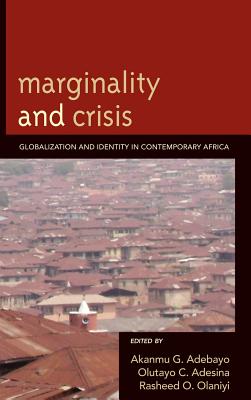"Marginality and Crisis competently documents and analyzes the manipulation, marginalization, and fragmentation of the mass of the African people through the agency of a decadent, materialistic, and fanatically secular culture that contemporary transnational capitalism purveys across the globe. Political and policy elites across the globe would do well to heed the call of this must-read volume---that the way forward is a return to the ontology of globalization as a commitment to the construction of an authentic global village, where shared human values and social solidarity are given free rein."---Adekunle amuwo, University of KwaZulu-Natal
"This is essential reading for those seriously interested in understanding the complex political, social, and economic dimensions of globalization in African societies and the imaginative response of these societies to this enigmatic postwar phenomenon. Adebayo, Adesina, and Olaniyi and their colleagues have given us a critical volume on the transformative impact of globalization in contemporary African states, effectively engaging intersections of the local and the global, tradition and modernity, state and society. With compelling case studies, this volume is an important and timely contribution to African studies."---Olufemi Vaughan, Bowdoin College
"This is a detailed study of an important subject. Marginality and Crisis brings out some of the neglected dimensions of globalization on a continent that has always been at the receiving end of global vicissitudes. The chapters are rigorous and lucid, and they provide all the analysis one needs to know on a phenomenon that is bound to dominate discussions in Africa for some time to come."---Abiodun Alao, King's College London
Marginality and Crisis: Globalization and Identity in Contemporary Africa extends the scope and understanding of the effects of globalization and its forces on Africa. With each chapter written by specialists who recognize that the future of Africa is entwined with that of the rest of the world, this volume explains with fresh vigor the new thinking on the historical specificity, value, opportunity, and shortcomings of globalization for a continent many regard as marginalized and in crisis. An invaluable source for scholars, students, and the general reader, the chapters in this book have confidently and clearly explored and explaind the crises that have engulfed the continent in the age of globalization. In the face of much pessimism, this volume identifies key areas in which Africa can become more proactive and outward-looking in response to the forces and values that take the globe as their reference points.
| FindBook |
|
有 1 項符合
Akanmu G.的圖書 |
 |
$ 8580 | Marginality and Crisis: Globalization and Identity in Contemporary Africa
作者:Adebayo,Akanmu G.(EDT)/Adesina,Olutayo C.(EDT)/Olaniyi,Rasheed O.(EDT) 出版社:Rowman & Littlefield Pub Inc 出版日期:2010-05-25 語言:英文 規格:精裝 / 15.2 x 22.9 x 1.9 cm / 普通級  看圖書介紹 看圖書介紹
|
|
|
圖書介紹 - 資料來源:博客來 評分:
圖書名稱:Marginality and Crisis: Globalization and Identity in Contemporary Africa
|










